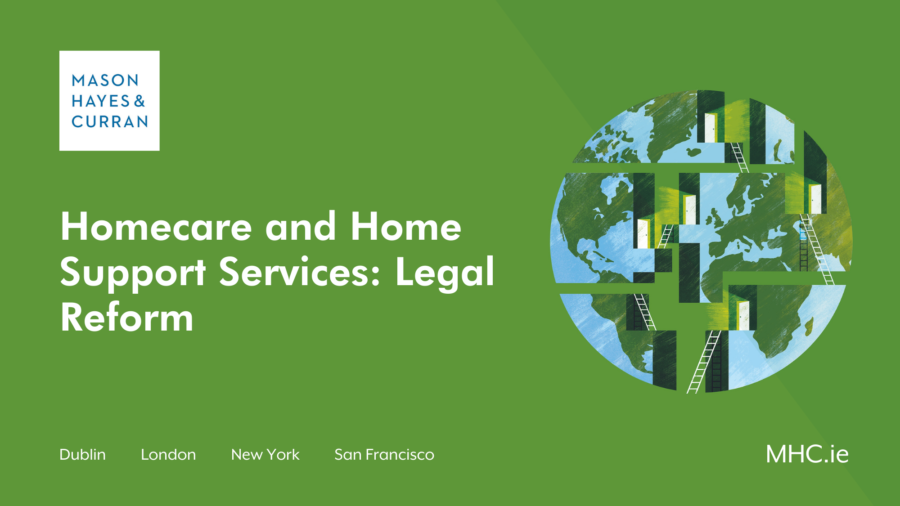Homecare and Home Support Services: Legal Reform

At present, there is no statutory entitlement to receive formal homecare or home support in Ireland and access to such services varies throughout the country. The majority of homecare and home support services provided in Ireland are delivered on an informal basis by family, friends, and neighbours. Publicly funded home support services are also provided directly by the HSE or by external providers commissioned by the HSE and, while free of charge, are based on service users’ assessed care needs.
Currently, there is no statutory regulation of private hospitals, homecare or home support services or other community based social services in Ireland. While the HSE, as both provider and commissioner of such services, oversees and monitors the provision of services it provides or procures, there have been many calls for the introduction of a national statutory scheme which would regulate both the publicly and privately funded home care and home support sectors.
The Department of Health (The Department) is developing a new statutory scheme for home support services in line with Programme for Government and Sláintecare commitments. In June 2022, the Department launched a public consultation on draft regulations for a statutory home support scheme. These regulations will sit alongside the new law. It is accepted that a new regulatory framework will not address all of the issues facing our health and social care sectors. However, it will go some way to ensure the elderly and most vulnerable in our communities are protected and cared for within a specific framework focusing on accountability, good governance, quality of service and best practices.
Proposed statutory home support scheme
When introduced, the new law will require homecare and home support providers to hold a license from the Health Information and Quality Authority (HIQA) before they can operate. HIQA will monitor and manage compliance by public, private, and not-for-profit providers of homecare and home support services. People providing such services will be called “home-support workers”.
It is proposed that the regulations will apply to home-support workers providing personal care or practical assistance to people who are ill, frail, disables or otherwise vulnerable living at home. Typically this includes assistance with:
- Personal hygiene
- Mobility
- Social engagement
- Day-to-day activities such as cooking, shopping and household tasks
It is envisaged that certain services, however, will be exempt from the proposed regulations including:
- Support provided to minors,
- Support provided in the context of personal relationships and where no money is exchanged, and
- Services provided exclusively by registered healthcare professionals such as nurses or physiotherapists
Also, a direct employment relationship between an individual home-support worker and a single servicer-user will also be exempt.
The regulations will set out the basic rules for how home-support providers should operate and cover four main areas: service-delivery, staffing, corporate governance and corporate oversight. Some key features of the proposed regulations include:
- A system of licensing which will include minimum requirements to qualify for a license and also allow HIQA to impose licensing conditions. It will be an offence to operate without a license.
- The imposition of specific staffing requirements on service providers to include recruitment, employment terms, education, training and supervision.
- Requirements on service providers to have a clear written statement of purpose which is readily available to the public, and which should be reviewed annually. Any changes to the statement of purpose will be required to be approved by HIQA.
- Requirements to implement policies concerning topics such as safeguarding and protection, risk-management, infection prevention and medication management. These policies must be monitored, reviewed and updated, as may be necessary, as set out in the regulations.
- Requirements to put in place and explain to service users any complaints procedures.
- Requirements to put in place written contracts to include minimum terms, including specific provisions on how the contracts can be terminated and notice requirements, with service-users. Providers are also required to draw up a personal support plan in respect of service-users and which is required to be discussed and agreed with the service-user and reviewed as required.
- Specific requirements in relation to the management of records, financial procedures, monitoring quality of service and compliance with the regulations. In addition, there are specific reporting obligations including producing an annual report no later than March 1st each year.
Response to draft regulations
Earlier this year, the Institute of Public Health published a report[1] examining the responses received by the Department from individuals and stakeholder organisations regarding the draft regulations. According to the report, 74% of all respondents believed the impact of the proposed regulations would be positive. In addition, the majority of respondents supported many of the requirements or obligations set out in the draft regulations. However, some concerns have been raised. A summary of the key concerns raised are as follows:
- While respondents were broadly supportive of formal education and training requirements, they are concerned that such requirements could exacerbate existing recruitment issue by pushing some workers out of the sector or deter them from joining it.
- Respondents raised queries as to how the costs of education and training would be funded. In addition, they are concerned that the costs of complying with the regulations could be very high and lead to reduced service provision and smaller providers leaving the market.
- Some respondents said that compliance, in particular increased recordkeeping, would be very burdensome and detract from the time home support workers had for engagement with service users.
- There was a concern that the exclusion of direct employment relationships from regulation could drive a move towards more provision of home support services by unregulated self-employed workers employed directly by service users, creating a two- tier system of regulated and unregulated home support.
- Over-regulation may lead to a one-size-fits-all standard of care when service users, workers, and providers require some flexibility.
In addition to the key concerns raised, clarification was sought on a number of matters including HIQA’s role as regulator and how the regulations related to the overall framework of home support provision, to new primary legislation and HIQA standards for the sector, and to the model of statutory home support provision and funding mechanisms being developed.
Many respondents called for the inclusion of a rights-based approach or specific human rights framework within the regulations and noted the importance of the regulations complying with, and making explicit reference to, the principles and legal obligations under the new Assisted Decision Making (Capacity) legislation. Also, it was suggested that the regulations should require providers to communicate clearly with service users in appropriate user-friendly formats, such as Plain English and Easy Read.
Conclusion
By 2040, it is estimated that 23% of the population in Ireland will be aged over 65. With the projected increase in our aging population, we need to prepare for the increasing demand for homecare and home support services. HIQA, the HSE, homecare support service providers and users all welcome the intention to reform the sector. This year, the overall home support has been increased by the Government and hopefully this means we will see the implementation of a statutory home care scheme soon.
If you are a homecare or home support service provider and have any questions or queries in relation to your business, please contact a member of our Healthcare or Corporate teams.
The content of this article is provided for information purposes only and does not constitute legal or other advice.
Share this:



